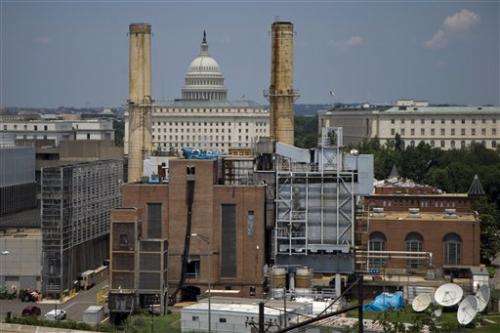Clock ticking for Obama climate change push

President Barack Obama is running out of time to make good on his lofty vow to confront climate change head-on, and Congress is in no mood to help.
Moving ahead on his own, Obama will announce a set of actions Tuesday that will take years to implement.
The centerpiece of the plan is a push to issue new regulations that would curb greenhouse-gas emissions from new and existing power plants, according to people briefed on the plan by the administration.
Other components will include energy efficiency, renewable energy sources and help for communities preparing for the effects of climate change.
"This is a serious challenge, but it's one uniquely suited to America's strengths," Obama said Saturday in a White House video announcing the speech at Georgetown University.
Yet environmental activists are frustrated that Obama, despite deeming climate change a priority as far back as his first presidential campaign, waited until his fifth year in office to issue a detailed plan. In his State of the Union address in February, Obama gave lawmakers an ultimatum that if Congress wouldn't pass climate legislation, he'd take action himself. Four months later, Obama appears to be done waiting.
"His view reflects reality," White House spokesman Jay Carney said Monday. "We've seen Congress attempt to deal with this issue, and fail to."
Days earlier, as word came of Obama's plans for existing power plants, the leader of the House of Representatives, Speaker John Boehner, called it "absolutely crazy," making clear the obstacles Obama would face in trying to push anything through Congress.
In going it alone, Obama's options are somewhat limited. But environmental activists say taking action to reduce the heat-trapping gases that coal-fired power plants emit would have the most impact. Forty percent of U.S. carbon dioxide emissions, and one-third of greenhouse gases overall, come from electric power plants, according to the U.S. Energy Information Administration, the Energy Department's statistical agency.
The Environmental Protection Agency, using its authority under the Clean Air Act, has already proposed rules for new power plants, but those rules have been delayed. Although finalizing the rules for new plants would likely compel the government to eventually take similar action on existing plants, the Obama administration has until now insisted it's focused on new plants.
People briefed on Obama's plan for existing plants said that rather than issue a specific new standard, Obama will announce he's directing his administration to work with states and interested parties to develop a cost-effective, flexible system that can curb emissions without costing so much as to create negative economic impacts.
That's a process that will assuredly drag on for years.
"If EPA proceeds with regulations, they should be based on adequately demonstrated technology and provide an achievable timeframe to allow the coal industry to continue advancing clean coal technologies," said Mike Duncan, who runs the American Coalition for Clean Coal Electricity.
So if Obama wants to see the new rules realized while he is still in charge, he has to start now.
Under the process outlined in the Clean Air Act, the EPA cannot act unilaterally, but must work with states to develop the standards, said Jonas Monast, an attorney who directs the climate and energy program at Duke University. An initial proposal will be followed by a months-long public comment period before the EPA can issue final guidance to states. Then the states must create actual plans for plants within their borders, a process likely to take the better part of a year. Then the EPA has another four months to decide whether to approve each state's plan before the implementation period can start.
"When you play all that out it does take you to the end of his second term," said Dan Lashof, who directs the climate and clean air program at the Natural Resources Defense Council. Still, Obama has the opportunity to "set a clear timetable and expectations about the level of emission reductions that can be achieved," Lashof said.
The rules may also face legal hurdles if opponents challenge them in court. Although the Supreme Court has upheld the EPA's authority to regulate greenhouse gases under the Clean Air Act, the issue remains largely uncharted waters. In one sign of the ongoing legal maneuvering over how much the government can do to tackle emissions, the Supreme Court on Monday said it will consider reinstating an EPA rule overturned by a lower court that would have used the cross-state air pollution rule to impose restrictions on emissions on plants in upwind states.
Another ticking clock is a goal Obama outlined in in his first year in office, during global climate talks in Copenhagen, to cut U.S. carbon emissions by about 17 percent by 2010, compared to 2005 levels. The U.S. for years appeared headed to meet that goal, helped by rock-bottom natural gas prices that made it cheaper for plants to shift from coal to cleaner-burning natural gas. But government data shows that the trend is starting to reverse, raising questions about whether the U.S will be able to meet the goal unless Obama intervenes.
"The administration has no chance of meeting the 17 percent reduction target without such a rule," said Conrad Schneider of the Clean Air Task Force.
Living up to international obligations reflects another challenge for Obama's climate change push: Americans, by and large, are less concerned than their counterparts about what the warming of the planet will mean for them. Just 40 percent of Americans said climate change is a major threat to the U.S. in a poll the Pew Research Center conducted in 39 countries in March and April. Globally, 54 percent of people said climate change threatened their country.
© 2013 The Associated Press. All rights reserved.



















